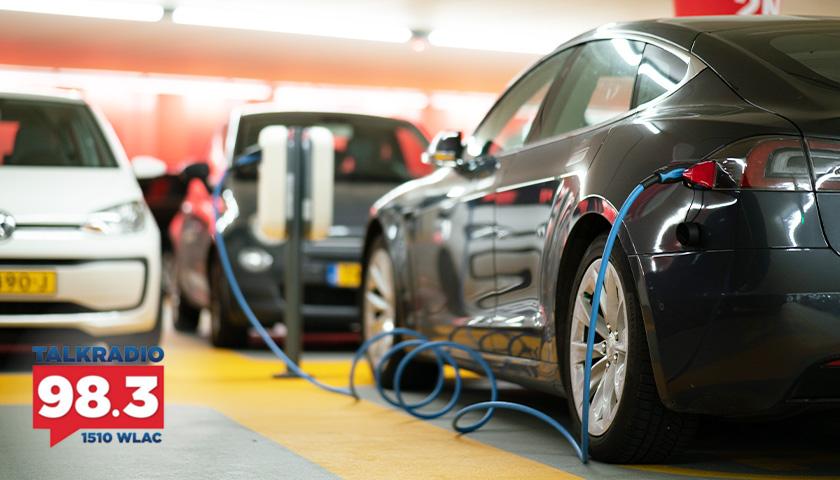Live from Music Row, Monday morning on The Tennessee Star Report with Michael Patrick Leahy – broadcast on Nashville’s Talk Radio 98.3 and 1510 WLAC weekdays from 5:00 a.m. to 8:00 a.m. – host Leahy welcomed the original all-star panelist Crom Carmichael in studio to discuss the massive subsidies afforded to electric vehicle companies and the consequences of the crippling speed to make the switch from fuel-powered vehicles.
Leahy: Crom, there is a certain element of the economy we want to talk about that has to do with the massive subsidies that are going to electric vehicle production and purchase. You had a few thoughts on that.
Carmichael: It’s not only the subsidies, it’s the mandates that are coming that are about to come out of the Biden administration on moving to electric vehicles. And this isn’t me saying electric vehicles are a bad thing, but the speed at which you make a change could very well be a terrible thing. There are lots of little other kinds of side things about this.
One is every dollar spent by traditional automobile companies, all of them now have a significant presence in the EV space, the electric vehicle space. And they’re spending a lot of money trying to improve those cars. But they have a certain amount of money they’re going to spend on RND.
So if they spend all of the money on RND for electric vehicles, it means they’re not spending any money on improving the engines of gasoline-powered cars. And the improvement in the efficiency of gasoline-powered cars over the last 15 to 20 years has been quite exceptional.
There are a lot of SUVs now that going down the interstate we’ll get 32, 33 miles a gallon whereas those same-sized cars 15 years ago got 16 to 18 miles to a gallon. But the other problem is you have enormous supply chain problems. An EV takes two and a half times as much copper to build.
Now we’re not talking about the environmental impact of mining copper, the real question is whether or not the actual ultimate environmental impact of EVs is even worth it. But that’s not the point here, because we’re headed down that road. But if you’re going to convert half of the automobile fleet right now, it’s about two percent, to being EVs in a really short period of time then you’re having to replace fossil fuel-powered cars with electricity.
And right now, for example, in California, you have rolling brownouts constantly and they still only have maybe in California four percent of the cars are EVs. And so they’re all kinds of unintended consequences in moving at a too fast rate and not to mention whether or not we had the capacity from an electric grid standpoint to power that many cars.
Leahy: I want to get your reaction to a couple of tweets from yesterday. Tesla Asia sent off this tweet and copied Elon Musk, the head of Tesla, about this. It was a photograph of a Tesla executive and a bunch of Chinese executives signing a document. And they said we set off on a new journey towards Master Plan Three, meet Mega Factory in Shanghai, China. That’s from Tesla, Asia.
To which our buddy Vivek Ramaswamy, who’s running for president, the guy behind Woke Inc. and who’s very successful as a biotech guy, only 37 years old said this. And I’d like to get your reaction. It’s a pretty lengthy tweet.
“This is concerning when we’re all forced to drive electric vehicles, the real master won’t be Elon Musk, it will be Xi Jinping, and the name Master Plan Three is eerily spot on. I love what Elon Musk is trying to do with Twitter but doubling down with the Chinese Communist Party is another matter.
Companies should and will continue to do whatever allows ’em to be most successful, but it’s the job of US policymakers not to let American companies sell Xi Jing Ping the rope today, that’ll use to hang us tomorrow.” Your thoughts?
Carmichael: Carmichael: I think that is just dead on. The way that he expressed is perfect. And the trick is recognizing where you are along the scale between a friend and an enemy because you’ve got about five different stops along the way. You have a friend, you have a competitor, you have an adversary, and you have an enemy.
Leahy: And China is moving from adversary to enemy.
Carmichael: They’re already in between those two.
Leahy: They’re closer to enemy than adversary.
Carmichael: I think so. To me, a clear enemy is one whom you are in open conflict with them. Now that doesn’t mean you’re necessarily at military conflict, but you are in an open conflict.
Listen to today’s show highlights, including this interview:
– – –
Tune in weekdays from 5:00 – 8:00 a.m. to The Tennessee Star Report with Michael Patrick Leahy on Talk Radio 98.3 FM WLAC 1510. Listen online at iHeart Radio.
Photo “Electric Vehicle” by Michael Fousert.





